FASS STUDENT LEADERSHIP AWARD
FILE YOUR NOMINATIONS NOW | FSLA 2023
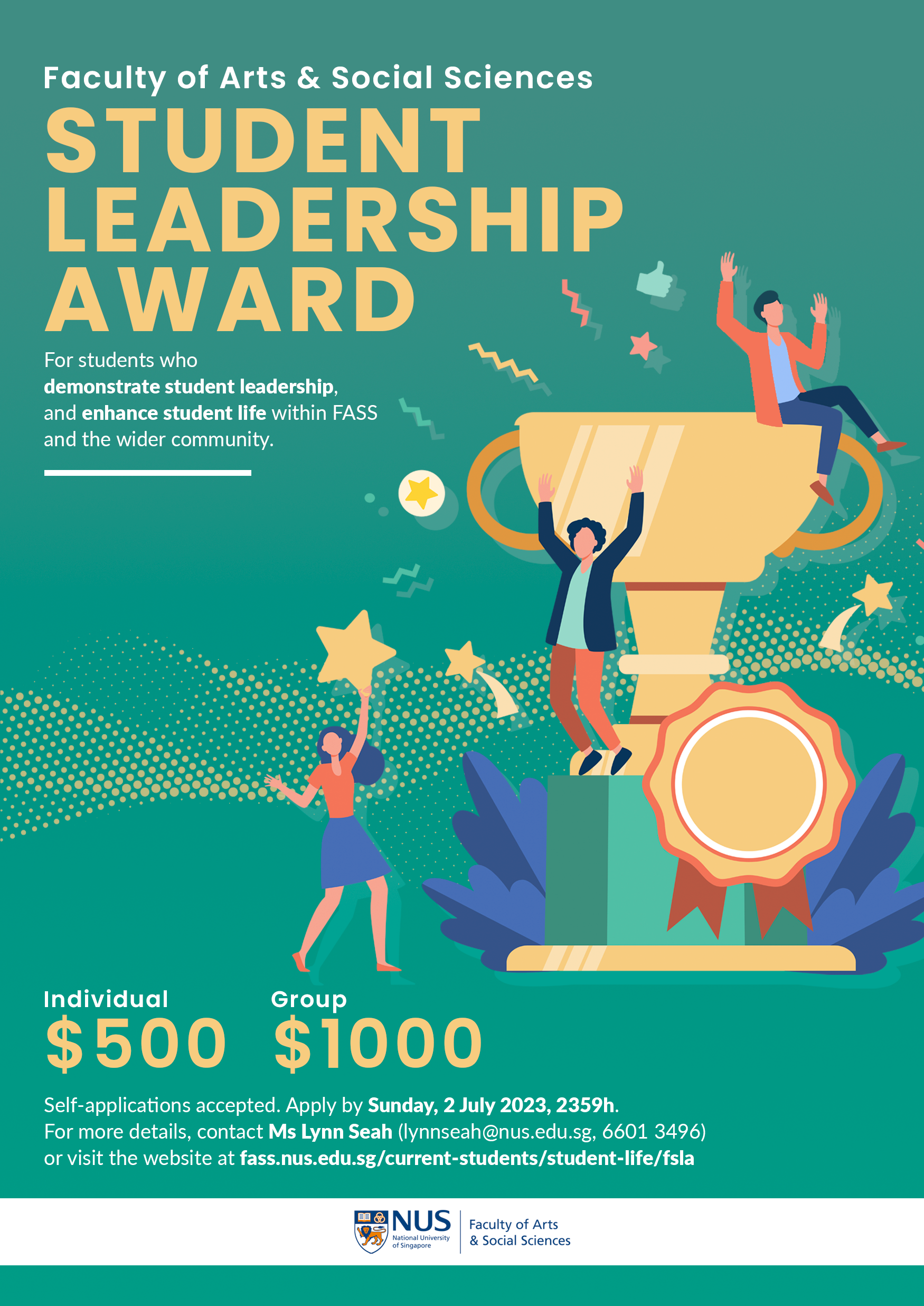
We are now open for nominations! If you know those among you who have started and run initiatives that have made a significant positive impact on the communities they serve, and who exemplify the qualities and values that the FASS Student Leadership Award (FSLA) programme seeks to promote — now is the time to nominate them so they get the recognition they deserve and serve as role models for all our student leaders.
Please download the nomination forms below.
General Eligibility Criteria
* Nominees must be current students or have recently graduated from the University.
* Nominees must have obtained at least the following GPA:
– 3.20 (Pass with merit) for Undergraduates
– 3.00 for Graduate Diploma students
– 3.50 for Masters (Research and Coursework) students
– 4.00 for PhD students
* Nominees must not have committed any disciplinary offences and/or flouted any University guidelines governing student activities, e.g. Financial Guidelines, during the period of evaluation.
* Nominees should be nominated only for achievements within the period 1 June 2023 - 31 May 2023.
* Only achievements pertaining to student CCAs that are not part of an academic project, or module requirement will be considered.
* Nominated projects or initiatives that are an extension of candidates’ research curriculum, Honours or Masters Theses may not be considered.
* Self-nominations are acceptable.
* Supporting evidence, where indicated, should be provided.
* Nominees are to enter their submissions in only one category (i.e. Individual or Group category).
Honour Roll | 2022
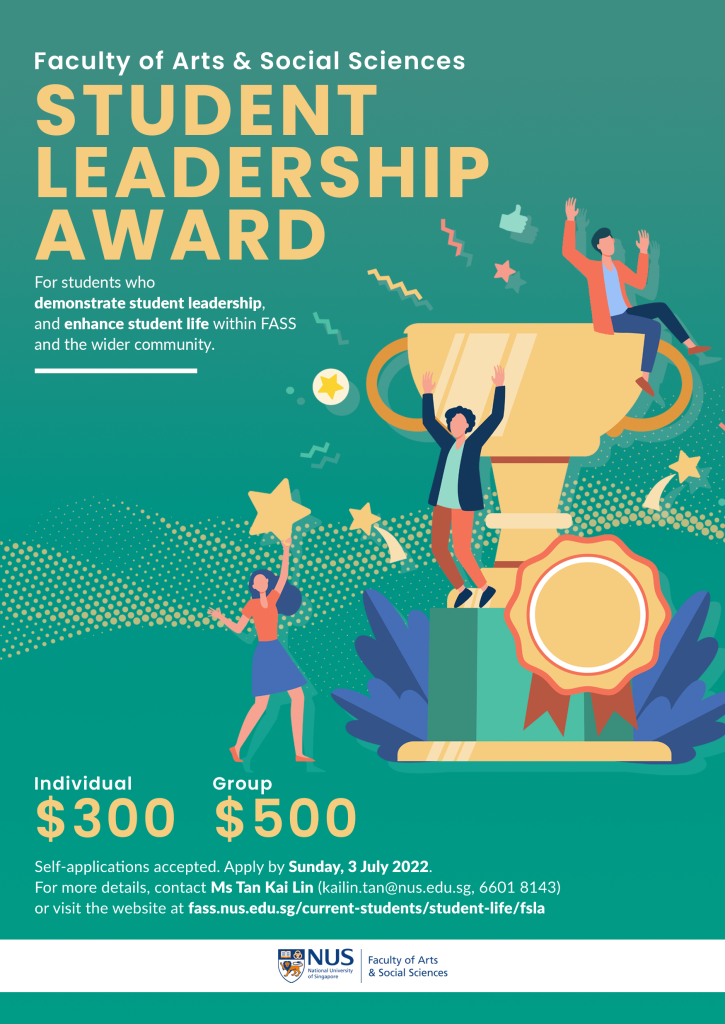
Congratulations to the following individuals, and the organisations they represent!
Their initiatives have made an impact on the communities they serve and they exemplify the qualities and values that the FASS Student Leadership Award (FSLA) programme aims to instill in all our student leaders.
INDIVIDUAL AWARDS
| Recipient | Project |
|---|---|
| Kwok Kar Hou, Matthew | NUSSU Advocates |
| Ganeash Selvarajan | InPsychOut – the NUS Psychology Society Podcast |
| Sophia Wong Zi Xin | NUS Students' Arts and Social Sciences Club (FASS Club); NUS Global Studies Club; NUS Aerial Sports; FASS Student Ambassadors |
GROUP AWARDS
| Recipient | Project |
|---|---|
|
Voon Jung |
impacT Interest Group |
Honour Roll | 2021
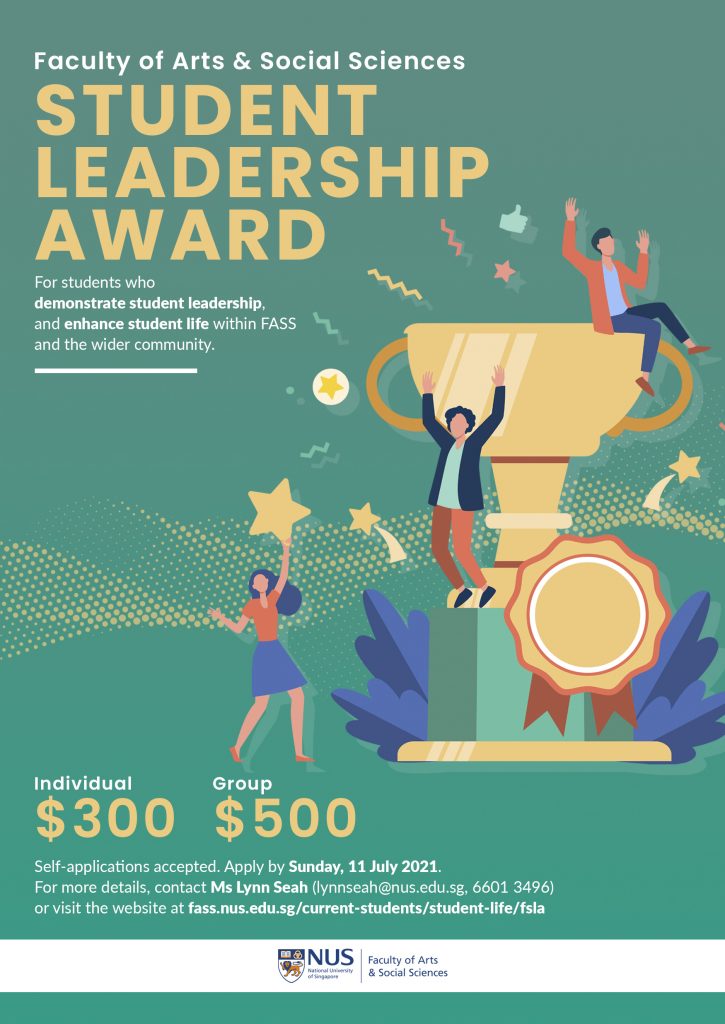
Congratulations to the following individuals, and the organisations they represent!
Their initiatives have made an impact on the communities they serve and they exemplify the qualities and values that the FASS Student Leadership Award (FSLA) programme aims to instill in all our student leaders.
INDIVIDUAL AWARDS
| Recipient | Project |
|---|---|
| Valerie Sim Hwee Ern | Children Mentoring Programme |
GROUP AWARDS
| Recipient | Project |
|---|---|
| Amelia Tai Si En Ng Poh Yee Brandon Wang Chin Heng |
SIGNapse |
| NUS History Society | 9th ASEAN Quiz Programme |
Honour Roll | 2020
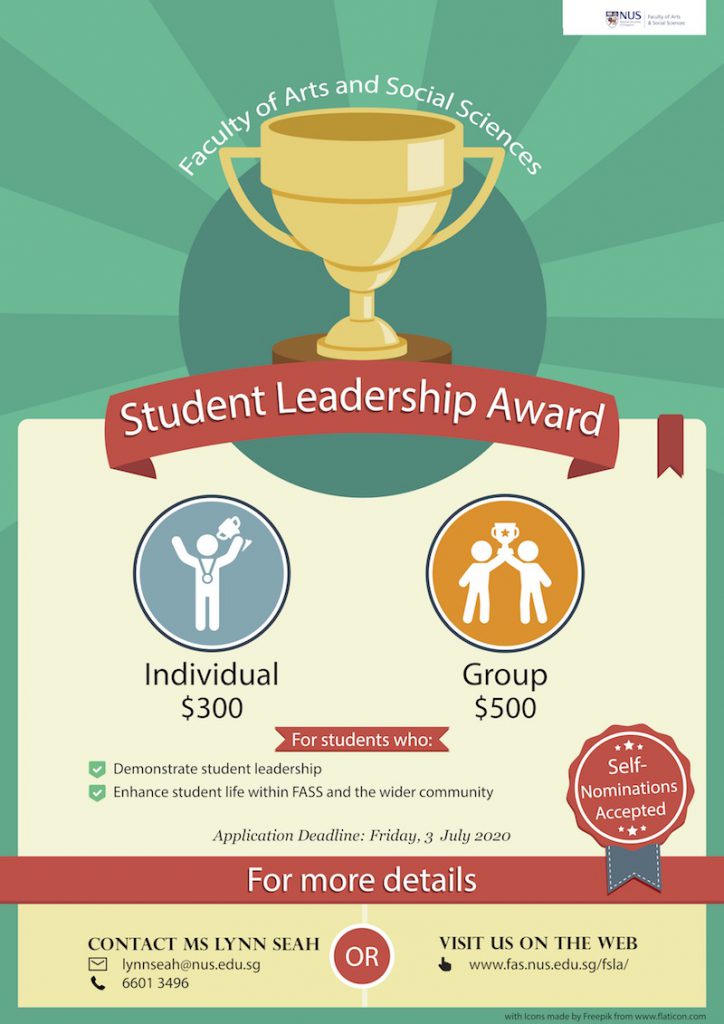
The following individuals, and the organisations they represent, exemplify the qualities and values that the FASS Student Leadership Award (FSLA) programme aims to instill in all our student leaders.
Congratulations to them all!
INDIVIDUAL AWARDS
| Recipient | Project |
|---|---|
| Jared Martens Wong Zhi Wei | Indigo Scales |
| Okky Puspa Madasari | ASEAN Literary Festival |
| Teng Chu Yu | NUS Students Against Violation of the Earth (SAVE) and NUS Vision of Equality for a Greener Earth (VEGE) |
GROUP AWARDS
| Recipient | Project |
|---|---|
| Nicholas Ong Yew Hui Crystal Yong Ting |
NUSGeogSoc x URA Workshops |
| Ho Zhi Hui Felix Tan Jia Song |
Skilio Industry Immersion Programme (SIIP) |
| NUS PPE Club | NUS PPE Club |
SOPHIA WONG | NUS AERIAL SPORTS

Could you tell us about your work with NUS Aerial Sports (e.g. any significant initiatives you led) and your motivations for initiating it?
NUS Aerial Sports (NAS) was the brainchild of my graduating seniors and I was lucky enough to be able to serve in the Presidential Cell, in its pioneering years! NAS is the first aerial and pole sports CCA in Singapore’s tertiary education scene. Because the nature of aerial and pole sports were also different from other sport CCAs, it was very challenging for us to formulate the Club’s activities and identity. To date, we’ve managed to make aerial and pole sports more accessible and affordable to all NUS students and address certain negative stereotypes that people might have towards the sport. Personally, I love pole sport and pole dance, it’s a hobby that empowers me a lot, so I really wanted to share my appreciation towards this sport with more people around me, and hopefully, this sport can speak to them as much as it speaks to me!
What was the impact of your project?
Thus far, more than hundreds of NUS students managed to try out and continue their pole and aerial sports journey through our subsidised courses and trial classes! I think NAS really laid the groundwork of normalising pole and aerial sports as a form of sport and art, rather than the typical misconception of pole and aerial sports being risqué, expensive, and difficult. We have partnered with many key players in the local pole and aerial sports, which also helped to cement our presence in the community and demonstrate the increasing interest university students have towards pole and aerial sports! Other universities have also reached out to us to learn more about the processes of setting up such a CCA!
What challenges did you face while working on it and what motivated you to keep going?
For sure, it was difficult to navigate through leading a brand new CCA that has virtually no other replicas in Singapore for us to take reference from. There was a lot of trial and error, many worries about the longevity of the CCA, and a lot of apologising too, as we make mistakes here and there. There were certainly low points (cried a little too), but I think that also comes with me being very emotionally attached to the CCA. What really kept me going was also knowing that I had my club members to take care of, and I didn’t want to let them down since they trusted me enough with this role right from the start and relied on me.
Are there any other projects you have worked/are working on?
While I was the President of NUS Aerial Sports, I also held the Presidential position for FASS Club and NUS Global Studies Club! Each of my team and I carried out many projects together throughout the year and I’m really very grateful for the opportunity to work alongside many hardworking and passionate friends for these! For the current AY, I’ll continue as the President of NUS Aerial Sports, so if you’re interested in that, I’ll be more than happy to share more and welcome you into the community ~
What are your fondest memories of NUS?
If I’m allowed to be cheesy… my fondest memories will definitely be the times spent with my FASS Club kids! Beyond pouring our blood, sweat and tears into different projects throughout our term (which I adore too, okay, I love working on student life projects), it’s also the little mundane things like ordering McDonalds into UTown at 5AM to accompany our friend for his suhoor, looking for six pairs of shark slippers all around FASS at midnight because the delivery man misplaced our order -- it’s these things that we did together that are all the more close to my heart!
What have you been up to since you stepped down as President?
I went on an exchange in Paris in the semester after I stepped down! I loved my time there… Europe just you wait… I’ll be back!! I’m currently interning at Project X, a non-profit organisation that works with sex workers in Singapore. I’m learning so many things at this internship, I actually love it so much even though I wasn’t even interested in the non-profit industry until very recently (I was pretty fixated on journalism previously), but the work I do now is really so fulfilling and meaningful for me that I can’t wait to explore more in this industry in the near future, both in my studies and at work!
JARED MARTENS WONG | INDIGO SCALES
FSLA 2020 Individual Award: Jared Martens Wong, Indigo Scales
FASS Student Leadership Award 2020 (Individual Category) recipient Jared Martens Wong shares why he set up Indigo Scales, its intended impact on the community, and what drives its growth and development today.
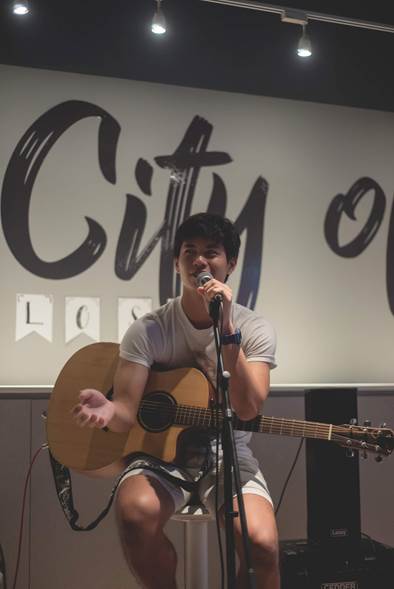 Tell us about your work on Indigo Scales and what were your motivations for initiating it.
Tell us about your work on Indigo Scales and what were your motivations for initiating it.
Jared: Indigo Scales is a music community that focuses on developing the local arts scene on a social level. In particular, we design and run events focused on personal growth, community development, and exploring social issues experienced in Singapore. As a co-founder and director of this community, I focus on co-designing event concepts that align with our community needs and goals. My contributions to Indigo Scales are motivated by the need to provide music opportunities that express individuals’ agency and capacity to contribute to Singapore’s wider arts scene.
What was the impact of your project?
As a community whose only criteria for membership is having a passion for music and wanting to be a part of the local music scene, we have over 90 members of various ages and social backgrounds. Paired with events and activities specifically designed to foster collaborations and create a safe space for self-expression, this has helped provide individual members with opportunities to form relationships organically through the medium of music. This has culminated in the ongoing development of a living and breathing community; There are countless instances where members have rallied together in difficult moments to provide emotional and material support for each other, well beyond the scope of music.
Beyond our immediate community, our events are also designed to facilitate audience participation, be it through educating our audiences on the norms, beliefs and values associated with certain genres, or simply choosing a space and tailoring setlists to encourage the type of audience participation we hope to see.
In numbers, we’ve held 8 public medium-scale events averaging 200+ attendants, and 40 smaller events averaging 30 attendants over 5 years, all of which address Indigo Scales’ goals of personal growth, community development and exploring social issues.
What challenges did you face while working on it?
In an environment where there’s a lot of emphasis on tangible and quantifiable measures of impact, I found it hard to articulate (even to myself) what the value of Indigo Scales was. I constantly felt the pressure to pursue other opportunities that were more profit-driven or focused on my long-term career.
What motivated you to keep going?
The passion and fulfilment experienced by members and other participants at our events served as a constant reminder that I should never view success and happiness in a monolithic way. As long as I continued to design and implement these events collaboratively and relationally, I knew I was creating events that would impact my members and participants in a personal and meaningful way. Perhaps it won’t always turn out the way we expected, but there’s always room to learn and make it better next time.
Any recent developments or updates to your project?
Currently, we are readjusting to the relaxing of COVID-19 restrictions, and looking to finish where we left off. We’ll largely be starting with private, internal events so our members can get familiar and comfortable performing to a live audience again, before moving on to more public events.
Personally, I’ve had the opportunity to further develop my skills in social research and implementation science through the organisations I have been working for and I’ve found these skills very relevant to running Indigo Scales. Specifically, this has helped me improve my ability to gather valuable qualitative and quantitative insights from my members and other stakeholders, as well as explore how music can impact social issues in a meaningful and evidence-based way.
As always, we’re looking for new members to join our community, be it to innovate or just to experience the local arts scene. Don’t be afraid to contact us to find out more!
Are you working on any other exciting projects right now?
I’m currently writing some music with some of the members of Indigo Scales just for fun. But besides that I’m focused on organising and designing new events for Indigo Scales as always!
What are your fondest memories of NUS?
In terms of academics, my group projects for Sociology of Deviance, Postwar Japanese Film and Anime, and Practising Anthropology and Sociology were just incredibly insightful and fun. Shoutout to my groupmates, y’all are amazing! And just all of the professors and modules in Sociology were pivotal in influencing how I want to live my life and do the work that I do currently.
Beyond that, it was the smaller, quieter moments of staying up late to talk to friends, or traversing the whole university when I was staying on campus that I think I will always remember fondly. There was a lot of space and agency in university that I never realised I needed (and definitely miss).
What have you been up to since you graduated from NUS?
I am currently an education analyst at the National Institute of Education (NIE) that looks at improving the translation of NIE’s research findings for teachers and policy makers. I hope to pursue my masters in Sociology next year and continue to grow both as a social researcher and a music community event organiser!
HO ZHI HUI, FELIX TAN | SKILIO INDUSTRY IMMERSION PROGRAMME (SIIP)
FSLA 2020 Group Award: Ho Zhi Hui and Felix Tan, Skilio Industry Immersion Programme (SIIP)
FASS Student Leadership Award 2020 (Group Category) recipients Ho Zhi Hui and Felix Tan share with us their reasons for establishing Skilio and what they have been doing to make it increasingly more helpful to jobseekers.
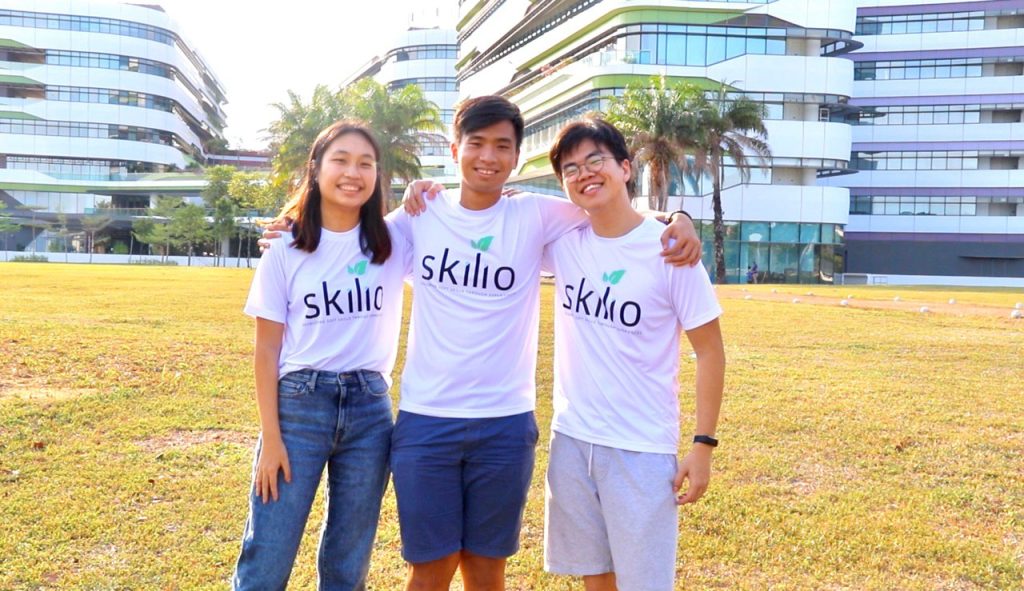
Could you tell us about Skilio Industry Immersion Programme (SIIP) and your motivations for initiating it?
As part of the Skilio Industry Immersion Programme, the Skilio team helped match students with short term industry immersion experiences in Singaporean companies/organisations. On top of that, Skilio provided our Skilio portfolio account free charge to all participating students to track their employability skills growth during these industry immersion experiences. Skilio wanted students to gain exposure to the working environment, and build up their network and skillsets in the spirit of changing economic paradigms, especially with the COVID-19 pandemic. The Skilio Industry Immersion Programme provided students with an attachment opportunity lasting 1 month, to grant them the flexibility to explore and find their passion areas.
What was the impact of your project?
The Skilio team had a total of 40 companies, 82 projects and 225 participating students who have joined us on this journey of employability skill development and industry exposure.
What challenges did your group face while working on it and what motivated you to keep going?
Adapting to the new work-from-home norm with a remote team was challenging, but it also taught us how to manage such a shift in working environment and what the other partner companies were experiencing as well. It was also the first time running a project like this, and with the relatively lack of experience, we had to learn how to manage expectations of the stakeholders (students, employers and team members). Nevertheless, the increasing uptake of each cohort and the words of encouragement from our stakeholders kept us going!
Are there any recent developments or updates to your project?
Two years down, the Skilio team is still working on supporting students with the school-to-work transition. With skillsets that students have acquired in school, the Skilio team hopes to move beyond the traditional proxy of grades in judging one's potential contributions to the workforce.
Are there any other projects you have worked/are working on?
Currently, we are working on building the largest skills-based Gen Z talent community to support them in their school-to-work transition with their employability skillets.
What are your fondest memories of NUS?
My fondest memories of NUS were the times I made mistakes, and realised how there were mentors who took time off to give me constructive criticism - be it in an academic context or in an extra-curricular context. Looking back, those were the times when I had the most room for mistakes, time to grow and an nurturing environment to tolerate the errors which came with inexperience.
What have you all been up to since you graduated from NUS?
The team has still been working on growing Skilio and touching the lives of more jobseekers out there!
DR RITU JAIN | DEBRA SINGAPORE
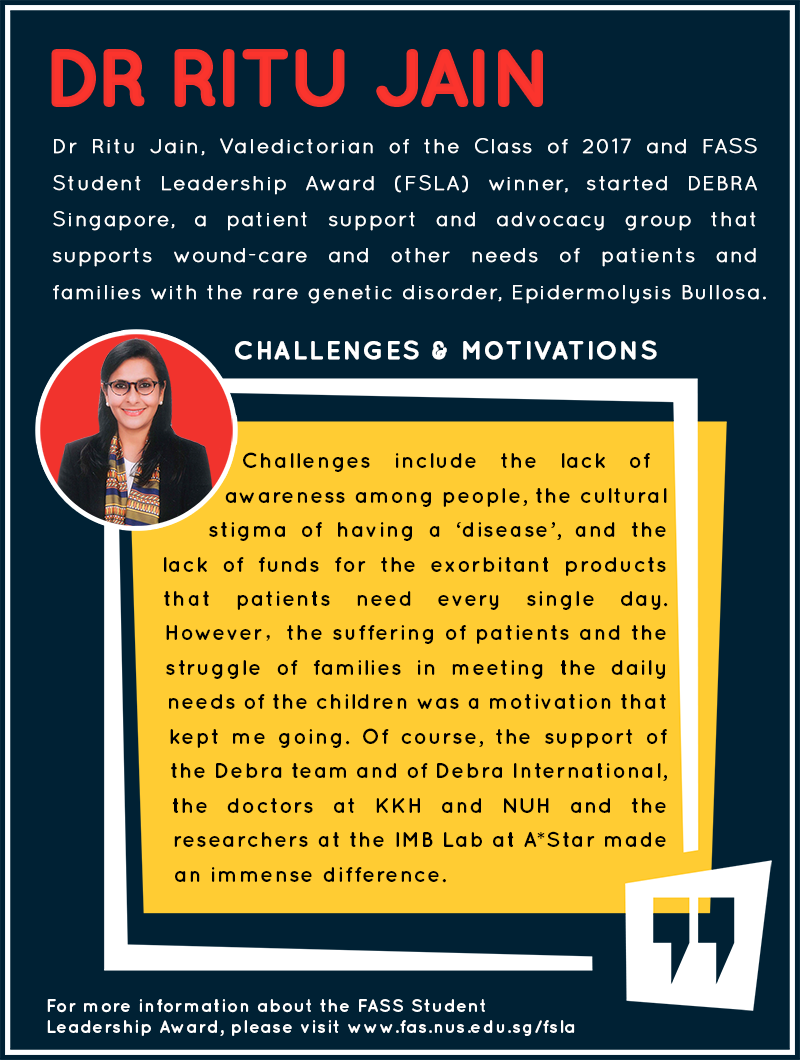
Babies born with Epidermolysis Bullosa (EB) are often referred to as “butterfly babies”, because they have skin as fragile – and tear as easily – as the wings of butterflies. Children with the condition may not receive hugs and embraces, as even loving touches may cause blisters and tears on their skin, wounds that may correspondingly lead to decreased mobility, disfigurement, and disability. As of 2018, there exists no standard treatment nor cure for the disease.
The lack of awareness of and support for patients of this rare genetic disorder was what prompted Dr Ritu Jain, Valedictorian of the FASS Class of 2017 and FASS Student Leadership Award (FSLA) Winner, to start DEBRA Singapore, a patient-led support group for children and families suffering from EB.
The FSLA acknowledges Dr Jain’s dedication to the cause: as the President of DEBRA Singapore, she has worked with pharmaceutical companies to bring clinical trials to Singapore, negotiated price cuts for essential dressings, participate in conferences, and organised talks, workshops, and activities in partnership with KK Hospital, National Skin Centre, and the National University Hospital. Please enjoy our interview with her below!
Could you tell us about your work on DEBRA Singapore and your motivations for initiating it?
DEBRA Singapore, a patient support and advocacy group that supports wound-care and other needs of patients and families with the rare genetic disorder, Epidermolysis Bullosa. I started it for two main reasons: 1) a family member suffering this condition and more importantly, 2) awareness of the need for a patient support group in the absence of support from the government, insurance policies, and/or any other agency.
What was the impact of your project?
Currently, we support all EB related needs of all EB patients as well as of a few in the Asian region (e.g., in Cambodia, India, Pakistan, etc.).
What challenges did you face while working on it and what motivated you to keep going?
The lack of awareness among people, the cultural stigma of having a ‘disease’, and the lack of funds for the exorbitant products that patients need every single day. The suffering of patients and the struggle of families in meeting the daily needs of the children was a motivation that kept me going. Of course, the support of the Debra team and of Debra International, the doctors at KKH and NUH and the researchers at the IMB Lab at A*Star made an immense difference.
Are there any recent developments or updates to your project? Are there any other projects you have worked/are working on?
Debra Singapore now participates in a global Butterfly Run that has enabled us to create awareness locally and internationally. We were also featured in a Channel News Asia documentary called the Butterfly Children (https://www.channelnewsasia.com/news/video-on-demand/butterfly-children/butterfly-children-9937670) and this has helped bring awareness of the condition to a large extent.
I was also able to co-organise the first EB conference in India in January 2018 and am organizing another in Singapore, in conjunction with the Regional Scientific Meeting of Pediatric Dermatology on April 27th, 2018. As part of our commitment to facilitating better delivery of healthcare for EB patients, I am working with doctors in Indonesia to enable the visit of a multi-disciplinary team of doctors and healthcare workers to Bandung, Indonesia in the first week of May. I am also working with EB patients and families in Pakistan through sharing information and creating a network of healthcare professionals to facilitate access to better EB care.
What are your fondest memories of NUS?
I’ll always cherish the various faculty events such as the FASSforward, graduate representative get-togethers, and the various seminars. However, some of my fondest memories are of hanging out at the Deck, drinking endless cups of coffee, sharing ideas and arguments with faculty members and other graduate students, and moaning about the agony of graduate experiences with co-suffering peers!
What have you been up to since you got your PhD?
Other than teaching full time, managing my family, running Debra Singapore, working on the board of Debra International and Rare Diseases International? Oh, just drinking endless cups of coffee and having endless conversations with the wonderful students at NTU and ex-students and colleagues at NUS ♥
PROJECT SCRIBE | REMEMBERING ROCHOR
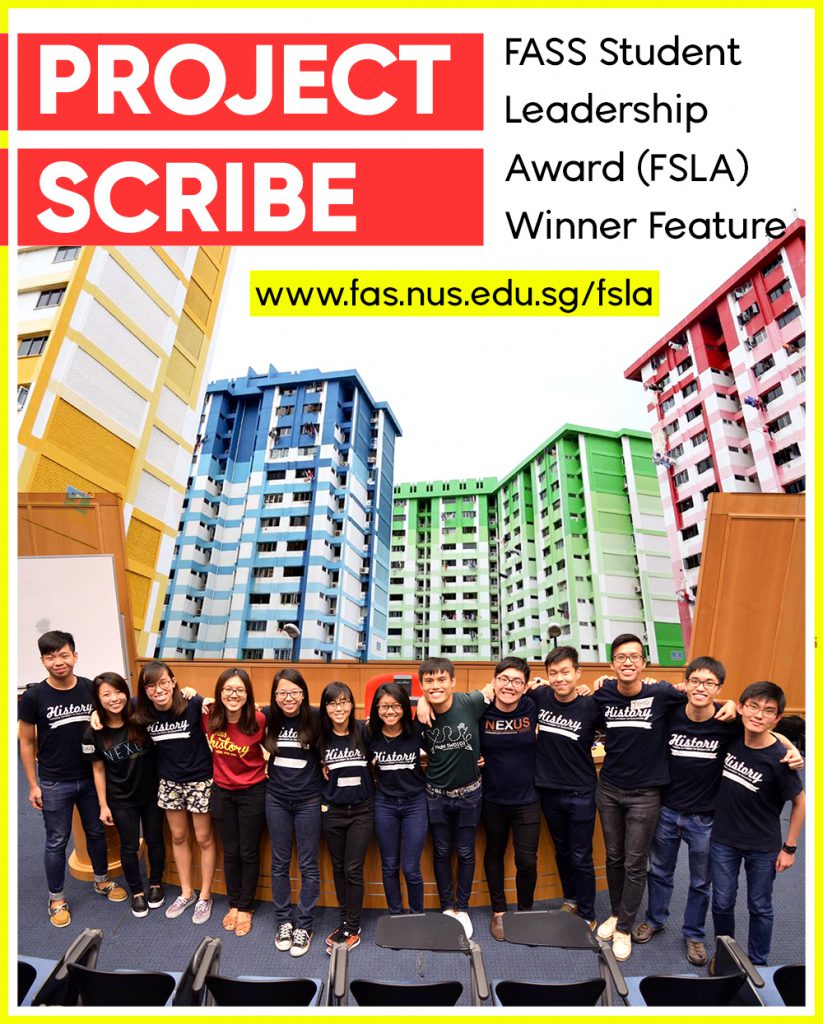
When it was announced in 2016 that Rochor Centre was to be demolished to make way for the construction of the North-South Expressway, the team behind Project Scribe: Remembering Rochor quickly sprang into action. They had two main goals: one, to equip secondary school students with basic research skills in the humanities; and two, to document the history of Rochor Centre, one of the first few estates in Singapore that integrated residential and commercial usage under one roof, so as to ensure that the legacy of the four rainbow-colored blocks remains in a society that prides itself on change and transformation.
Over four months, Project Scribe matched thirteen teams of secondary school students with undergraduate mentors from NUS, who guided the former on the basics of first-hand research and imparted the necessary know-how to interview the residents and tenants of Rochor Centre. As the 81 secondary school students immersed themselves in research and archival work, they grew to realise that history is happening right now beneath their feet, in the process developing a greater appreciation of the discipline beyond textbook knowledge. Project Scribe concluded its run four months later with short presentations from the respective teams, which further impressed on the students the power of oral history.
We speak to the Project Directors, Lim Natasha Ann (N) and Lim Jia Yi (J), then-President of History Society (HISSOC), Timotty Tay Jun Jie (T), and Vice-President, Low Hui Min Clarissa (C) to find out more about Project Scribe. The four were quick to highlight that Project Scribe would not have been possible without the help of volunteer mentors and students across NUS, whose extensive contributions ensured the success of the project.
Enjoy the interview below!
1) Could you tell us about Project Scribe: Remembering Rochor and your motivations for initiating it?
N: Project Scribe is an oral history project that NUS HISSOC undertook after its first run. As many of us would like to develop a greater interest in History among youth, this project aimed to expose students to different methods of obtaining sources to provide alternative voices to Singapore’s history.
J: NUS History Society were not the pioneers in Project Scribe. We first heard about this project from two of our seniors, Nadjad and Darrell, who ran this programme in the University Scholars Programme (USP) and were looking for people to sustain this endeavour.
C: HISSOC then assembled a team together and thought about using this programme to capture the memories of the residents in Rochor Centre, which was about to be demolished at that time in 2016.
2) What was the impact of your project?
N: Our project reached out to over 50 students from seven different schools, and we produced a booklet for some residents of Rochor Centre to capture their fond memories of the neighbourhood.
T: To equip the secondary school students who would be unfamiliar with oral history methods, we also ran a one-day workshop that educated them on the historical method and how historians utilize primary sources to craft narratives and to learn to use the recording devices that we have loaned from the Faculty.
J: We also had NUS student volunteers who mentored them in writing these narratives over a period of three months. Some of our peers were not even History majors, let alone part of HISSOC officially, and we are glad to have met them along the way. Also, our juniors from the Society also took the programme up for the 2017 iteration.
3) What challenges did your group face while working on it and what motivated you to keep going?
N: We faced some difficulties obtaining funds, and had to seek support from the National Heritage Board (NHB) under the SG50 project applications.
T: We also sought funding from the Lifelong Learning Institute. We also found it difficult to work with a Residents' Committee that was technically non-existent, as residents were already beginning to move out of the premises when we began the project.
C: We came across quite a lot of obstacles along the way. Funding was definitely a huge issue. We learnt that there were numerous criteria to meet if we even want to apply for any sort of funding from FASS, or even do any sort of event in FASS.
4) Are there any recent developments or updates to your project?
C: HISSOC carried out a second round of Project Scribe in 2017, focusing on the memories of residents living in Tiong Bahru.
5) Are there any other projects you have worked/are working on?
T: Yeah, the project of growing up after graduating I guess.
6) What are your fondest memories of NUS?
N: The Yong Tau Foo stall in FASS. Definitely.
T: It was a pretty transient but carefree time in hindsight. I vaguely remember the strangest of conversations from the most random of people at various points of my four years there. My memory is failing.
7) What have you all been up to since you graduated from NUS?
T: Three of us are busy molding the future of our nation, so we are still hopeful about impacting youth in the future. Jia Yi is continuing her journey in higher education in Waseda, Japan, busy with her thesis.
KEVIN MARTENS WONG | REVIVING KRISTANG
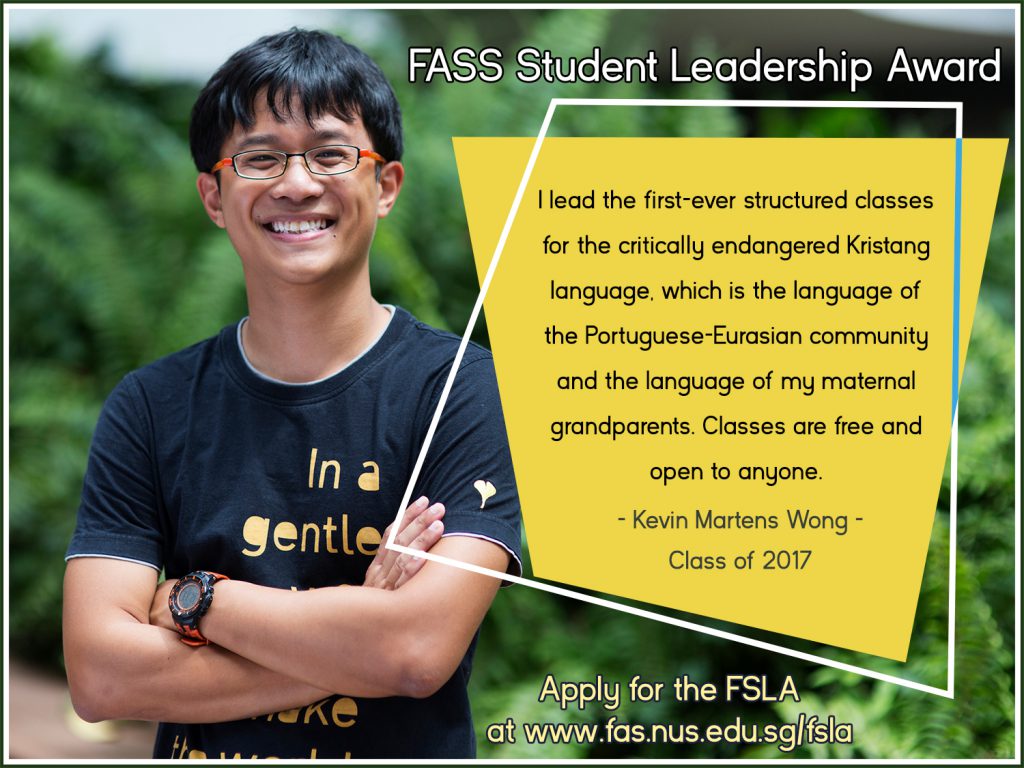
Could you tell us about your work on Kodrah Kristang and your motivations for initiating it?
I lead the first-ever structured classes for the critically endangered Kristang language, which is the language of the Portuguese-Eurasian community and the language of my maternal grandparents. Classes are free and open to anyone.
What was the impact of your project?
The project has contributed in large part to a significant reversal in Kristang's decline, with over 500 people joining our classes since we got started in March 2016, and greatly raising the profile of the language, once recognised in Singapore but forgotten since the 1930s. Kodrah and I have been featured by the BBC, Agence-France Presse, Channel NewsAsia, 938LIVE, The Straits Times, OurSG, Revista Macau,Observatório da Língua Portuguesa, TODAY, The New Eurasian, Six-Six, and The Independent, reaching over 69 million people; I have also spoken about Kristang at conferences at the University of Tampere, the University of Hong Kong, University of Hawaii at Manoa, the University of Macau and the National University of Singapore's College of Alice & Peter Tan, and as an invited speaker at the University of Alaska Fairbanks, the University of Malaya, Eunoia Junior College, Eunos Primary School, Anglo-Chinese School (Independent), the National Library's Friends of the Museum project, and the National University of Singapore's College of Alice & Peter Tan and Department of English Language & Literature.
What challenges did you face while working on it and what motivated you to keep going?
A major challenge has always been long-term sustainability, since the Core Team has had to balance the demands of our fulltime jobs, families and other responsibilities on top of Kodrah.
Are there any recent developments or updates to your project?
We're initiating our first ever level 4A and 4B classes in July 2018 at Cairnhill Community Club.
What are your fondest memories of NUS?
I really enjoyed my time at the College of Alice & Peter Tan (CAPT)!
What have you been up to since you graduated from NUS?
I've been training to become a teacher in the public school system at the National Institute of Education, and have also been working on my next novel.
HYSEN LIM | MASKS FOR NUS CLEANERS
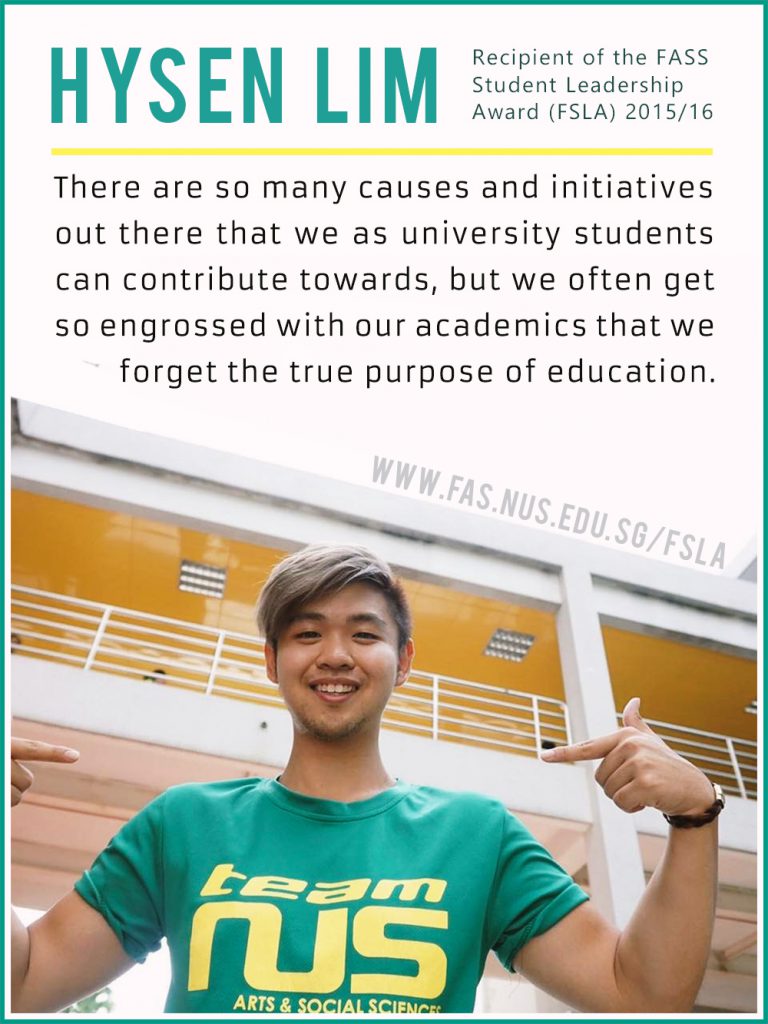
Singapore experienced one of its worst Haze Crises on record in September 2015. As headlines continually quantified in numbers the smog in front of everyone’s eyes and the resulting frustration, Lim Hsyen was busy crowdfunding to buy masks for cleaners in NUS, sourcing for mask distributors, and activating his friends to help distribute the masks. His thoughtfulness for the less fortunate earned the attention of the University, which facilitated his efforts by helping to distribute the masks.
Hysen’s “NUS Mask for Cleaners Initiative” also received coverage in the local media, which helped to inspire similar initiatives such as the “Mask Outreach 1.0” that saw groups of FASS undergraduates distributing masks to the Bukit Merah Rental Flats. Hysen’s heart for the community was deeply inspirational for many, and the Faculty rewarded his efforts with a FSLA Individual Award in Academic Year 2015/2016.
Please enjoy our interview with him below!
Could you tell us about your work on Masks for NUS Cleaners and your motivations for initiating it?
I started the Masks for NUS Cleaners initiative in 2015 during an especially long period of haze. While walking around U-Town, I realised that the cleaners on campus were not wearing masks with adequate protection, or even at all. With the lessons and values I cultivated from my residence at CAPT, I talked to the cleaners to find out more about their situation. With the understanding that appropriate masks were not provided for them, I decided that I would use my social media pages to crowdfund and buy the masks for them. At the same time, I went around looking for suppliers who were willing to help me in this cause. Thankfully, I managed to raise enough funds from NUS alumni, current students, relatives and friends within 12 hours.
What was the impact of your project?
Through the initiative, 800 masks were distributed to the cleaners within a day. Most importantly, it inspired my friends to do something meaningful during the haze period.
What challenges did you face while working on it and what motivated you to keep going?
I was questioned by some friends who thought that I should be spending my time revising for the mid-terms instead. However, I realised that this was not what university education is about. There are so many causes and initiatives out there that we as university students can contribute towards, but we often get so engrossed with our academics that we forget about the true purpose of education.
Are there any other projects you have worked/are working on?
I also helmed the Inter-Faculty Games for FASS in 2014. My team initiated the sale of T-shirts to help fund our sportsmen and sportswomen.
What have you been up to since you graduated from NUS?
I’m currently doing research and marketing in one of the Ministries.
FRANCESCA PHOEBE WAH | BLESS
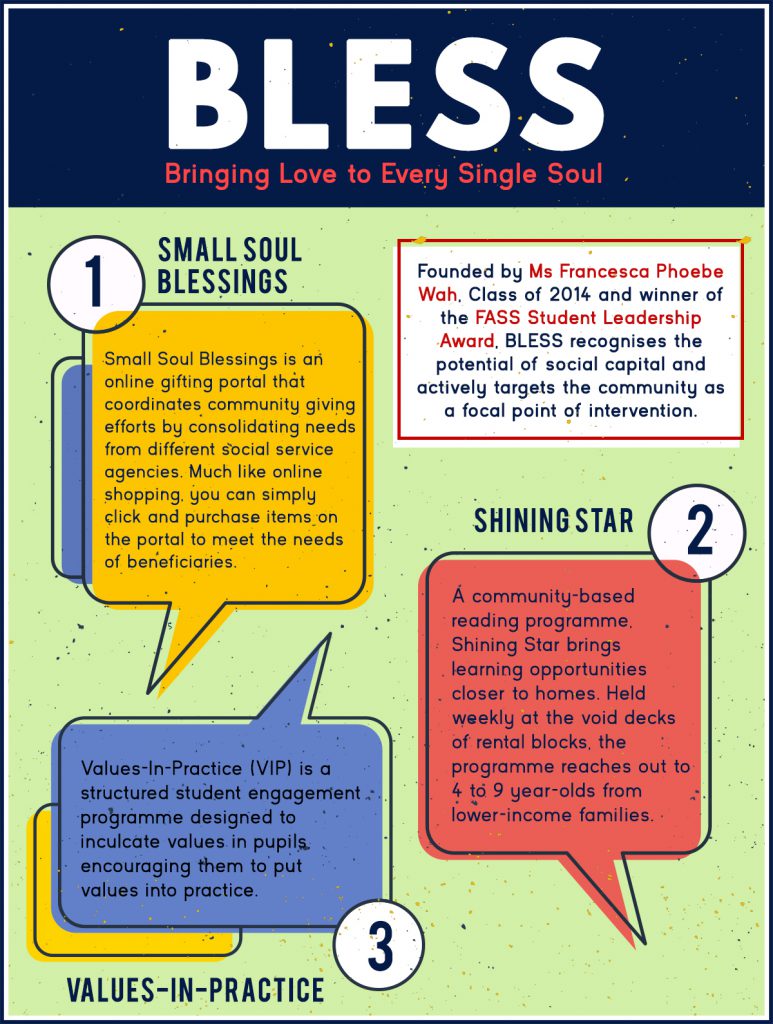
When Ms Francesca Phoebe Wah (Class of 2014) founded Bringing Love to Every Single Soul (BLESS) in 2014, her conviction was a simple one: every community is its own strongest resource. As such, to create sustainable changes in Singapore, the Non-Profit Organisation dedicates itself to community capacity building, or empowering communities to help themselves, which consequently enables members to co-create solutions to address problems; increases the sustainability of volunteerism; and establishes the social networks that underlie a caring society.
BLESS currently runs three programmes for the underprivileged, with each addressing a different social need. Francesca’s achievements best exemplify the Faculty’s commitment to cultivating all-rounded students, and she was awarded with a FASS Student Leadership Award in Academic Year 2014/2015. Find out more about Francesca’s motivations behind BLESS below, and apply for the FSLA now!
Could you tell us about your work on BLESS and your motivations for initiating it?
Bringing Love to Every Single Soul, BLESS, is a registered Non-Profit Organisation, incorporated on 21 June 2014. With an overarching framework of “A Community for Community”, BLESS recognises the bountiful potential of social capital and actively targets the community as a focal point of intervention. BLESS currently has three key programmes under our belt, with each one focusing on a different social need.
| Small Soul Blessings |
An online platform that congregates and presents needs from different social service agencies, Small Soul Blessings coordinates community giving efforts to meet the physical and emotional needs of beneficiaries. Much like online shopping, one can simply ‘click’ and purchase items on the online gifting portal on behalf of our beneficiaries. BLESS sources for supplies in bulk for cost savings, and distributes the gifts to the children to fulfil their wishes. |
| Shining Star Reads |
A community-based reading programme held at the void decks of rental blocks to bring learning opportunities closer to homes, Shining Star reaches out to 4 to 9 year-olds. Reading sessions are held on a weekly basis for children from lower-income families. For each reading session, there are five components: (a) reading for understanding, (b) reading for fluency, (c) word learning, (d) completion of learning sheets and (e) mobile library. |
| Values-in-Practice | Values-In-Practice (VIP), is a structured student engagement programme to intentionally inculcate values in pupils, encouraging them to put values into practice. It features 10 activity booklets and 8 storybooks, which are developmentally appropriate for each primary level. |
What was the impact of your project?
| Small Soul Blessings | In our recent cycle of Small Soul Blessings, we have expanded our beneficiaries to include the elderly. Of which, we blessed the seniors from Kampung Kapoor Family Service Centre with quad sticks and walking frames. As of today, a total of $34,106.75 has been collected through our online portal and we have blessed 5,030 children. We have also done cost savings of $41, 351.73 through bulk purchase. |
| Shining Star Reads | Shining Star Reads started with just four volunteers, a mat and borrowed books at Clementi Ave 2. And today, with the support from South West Community Development Council, we have grown from a humble 4 volunteers to 9 reading groups. |
| Values-in-Practice | With support from South West Community Development Council, we piloted VIP in three schools and the response has been positive. With more teachers coming on board, we have a refreshed VIP framework to inculcate values in our children. |
PAMELA LOW | TINGKAT HEROES
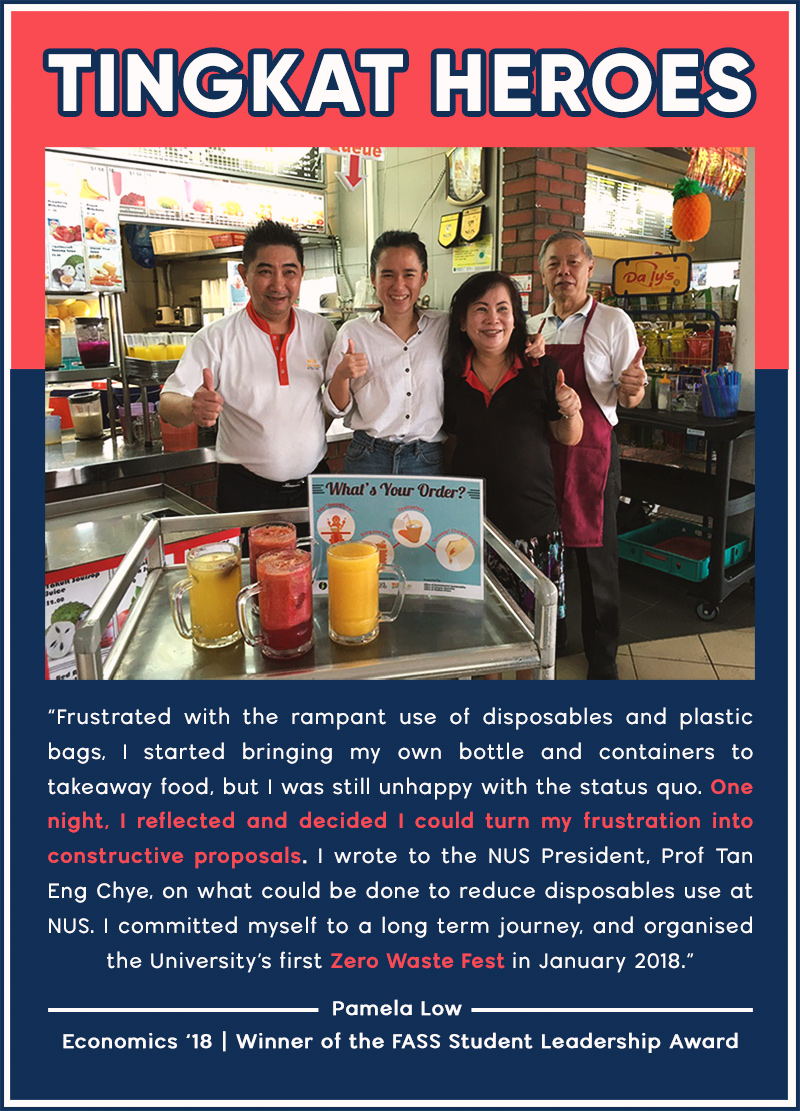
Could you tell us about Tingkat Heroes and your motivations for initiating it?
My project had a simple objective of reducing waste at NUS. I went for exchange in Germany in AY1617 Semester 2 and living like a local, bring my own grocery bag (as they charge for plastic bags), having the chance to take a module on Energy Law in the European Union (although I was an Economics student!) made me acutely aware of my consumption habits and appreciate how important it was to be live more responsibly and sustainably.
Coming back home, I was frustrated with the rampant use of disposables and plastic bags. I started bringing my own bottle and containers to takeaway food, but I was still unhappy with the status quo. One night, I reflected and decided I could turn my frustration into constructive proposals. I wrote to the NUS President, Prof Tan Eng Chye, on what could be done to reduce disposables use at NUS. I committed myself to a long term journey.
What was the impact of your project?
I organised NUS first Zero Waste Fest in January 2018 at The Deck and worked with the fruit juice uncle to implement a disposable charge on disposable cups. He also brought in reusable cups to support the initiative. Uncle shared candidly that he appreciated when people drink fruit juice from a glass cup and bringing that back was meaningful to him. He used to provide glass cups in the first 35 years of his operations but made the switch to plastic cup in part, due to fast culture. I worked with OES and OCA on the above initiatives, I am grateful for the support I received from he management. When we implemented the charge on disposables, patrons chose reusables more often, showing how effective a charge can be as opposed to a subsidy (similar to what I experience in Germany with plastic bags)
I also worked with OHS to remove the use of disposables in the halls & residences, they even provided residents their own set of reusables in the welcome package for AY1819.
I knew I wanted to change policies to achieve impact at scale, and am glad to have contributed.
What challenges did you face while working on it and what motivated you to keep going?
I did all these in my last semester of school, hence balancing my thesis, being a teaching assistant and all the ground work I had to do, running around getting approvals, convincing partners and decision makers to come onboard my initiative was not easy. What motivated me were the enlightened leaders I got to work with and knowing I was not alone in pushing for a more sustainable campus.
Are there any recent developments or updates to your project?
Since I graduated, I have also organised a Sustainability Camp for the public, a charity Christmas dinner with would-be food waste in partnership with MasterChef Zander Ng, TreeDots and DBS, facilitated for the environment version of Youth Convo (by MCCY and NYC), was on a panel discussion with Minister Masagos for an event by Eurasian Association and NUS first eco-fest in January 2019!
Are there any other projects you have worked/are working on?
Now I am curating new content and partnerships on my Instagram @tingkats.sg, where most of my initiatives are documented 🙂
I got a scholarship to attend Smith School Enterprise and the Environment Summer School (University of Oxford) in July 2019 and I am looking forward to it!
What are your fondest memories of NUS?
Leading the rugby team, staying in Temasek and Eusoff hall and Deck YTF!
What have you been up to since you graduated from NUS?
I am working at Sentosa Development Corporation now and will be embarking on my Masters in Environmental Management come August 2019 at NUS.
BENJAMIN LAU | NUS ECONOMICS SOCIETY
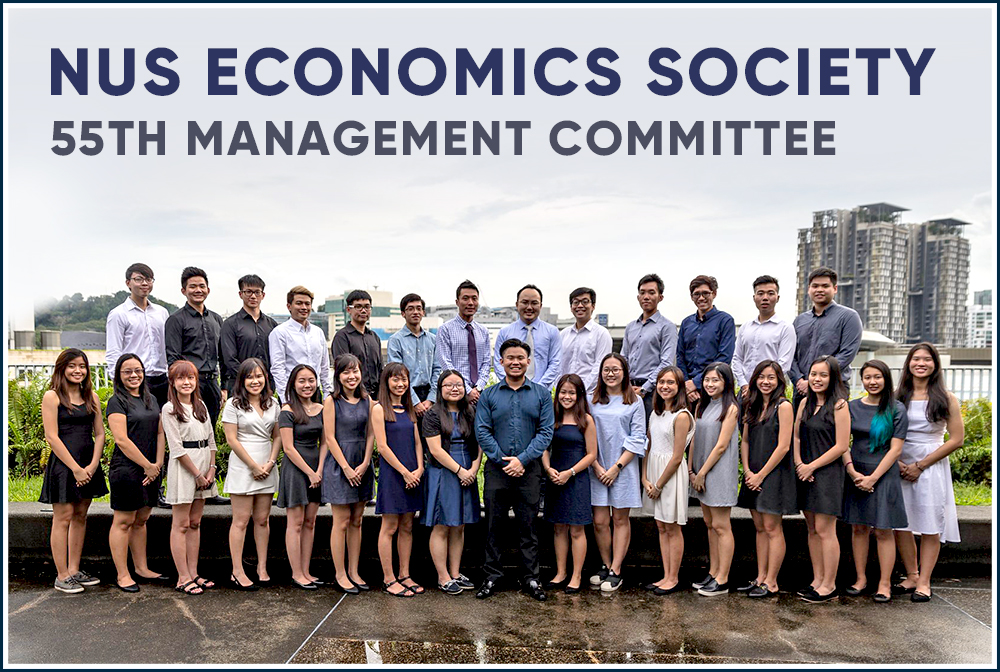
Could you tell us about your work as Economics President (any new initiatives you led) and your motivations for initiating it?
When I first took up the mantle for the 55th Management Committee of NUS Economics Society, I realised the society could be doing so much more for the students. I recruited a larger, more robust team (of nearly 30 people). Some of the projects I initiated was the Student Dialogue - where senior students can give advice to junior ones, and the Economics Japan Trip - where a group of economics students went to Japan and did an immersion.
What was the impact of your project?
I believe the impact of the 55th Committee remains today. When I look at the website of the Society, I still see similar teams, carrying out similar projects on a similar scale! I am proud that my committee laid the groundwork and I can only see greater heights reached for the future batches.
What challenges did you face while working on it and what motivated you to keep going?
One of the challenges I faced was managing morale. I was by far no where near a good leader. I remember sending one of my Assistant Vice Presidents a long and harsh text, which to be honest, I forgot the reason for. However, my peers in the committee are understanding and gave me a chance - I am proud to say that I am really good friends with that AVP today 🙂
Are there any other projects you have worked/are working on?
Since I stepped down from the society, I have in fact stepped up to serve at the national level. I currently serve as the Vice Chairman of the Economic Society of Singapore (ESS) Youth Wing, a position I have held to this day. It has always been a pleasure to help bright and driven Economics students all over Singapore reach their goals, and I am happy to be in a position that can make it happen.
What are your fondest memories of NUS?
My journey in NUS Economics Society started out in Economics Camp (Freshman orientation), and Econs Camp will always be in a special place in my heart. Being a freshman in 2016, and stepping up to be the Project Director in 2017. Whenever I look back at the photos of the camps I attended, nostalgia inevitably fills my soul. I made the best friends during camp and if I could turn back time - I would do it all over again.
What have you been up to since you stepped down as President?
I've been preparing myself to enter the workforce! Since stepping down, I have in the fixed income team at SGX, and am currently interning at the fixed income syndicate team at DBS.
KHOO YI FENG | NUS MENTAL HEALTH WING
FSLA: Khoo Yi Feng, Founder, NUS Mental Health Wing
FASS Student Leadership Award Winner, Khoo Yi Feng (FASS '17), shares his motivations for founding the NUS Mental Health Wing and the objectives he has set for it.
JOSHUA FOONG | bantu.life
FSLA: Joshua Foong, Co-Founder, bantu.life
FASS Student Leadership Award Winner, Joshua Foong (FASS '18) shares what he has done with the social enterprise he co-founded, bantu.life.
The philosophy behind bantu.life is a simple one: helping others should be easy. In the absence of a platform for volunteer management, however, volunteering is often unnecessarily tedious for both volunteers and non-profit organisations (NPOs) – at the same time as individuals can’t find volunteering opportunities that are convenient and which match their skill sets, NPOs spend excessive time on administrative procedures. bantu seeks to change that.
Co-founded by Joshua Foong (FASS '18), NUS Overseas Colleges alumnus, and NUS Students' Arts and Social Sciences Club (FASS Club) President in AY2014/15, bantu is a social enterprise that aims to use 21st century technologies to empower NPOs and streamline processes involved in the administration and management of volunteers. An avid volunteer himself, Joshua’s passion for bantu and volunteerism is palpable – just watch the video below for a taste of it!

